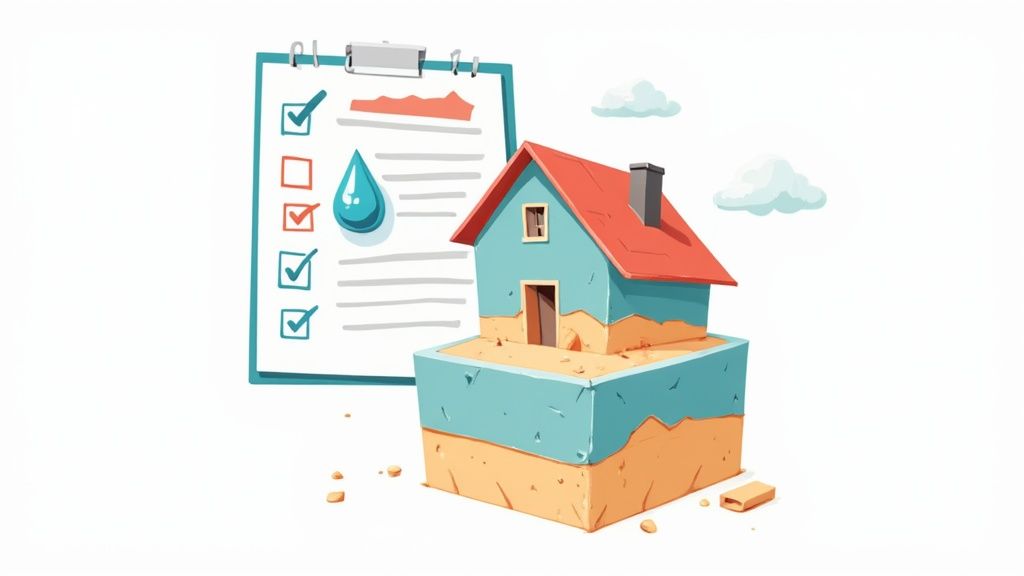In the fast-paced world of real estate, efficiency is everything. For realtors, one of the biggest time sinks isn't showing homes; it's the endless back-and-forth of collecting documents and information from clients. This is where a strategic approach to information collection becomes your most valuable asset. Platforms like Superdocu are revolutionizing this process, allowing you to build streamlined, branded portals for secure document and information gathering from sellers.
By replacing a traditional, static seller questionnaire real estate form with a dynamic Superdocu workflow, you can gather everything from disclosures to financial documents effortlessly. Superdocu provides pre-built templates specifically for real estate, sends automated reminders to your clients, and gives you a central dashboard to track submissions. This not only saves you countless administrative hours but also elevates the client experience from the very first interaction, setting a professional tone for the entire transaction.
To further streamline the selling process and ensure all parties are well-informed, consider exploring additional resources for sellers. This article will break down the seven non-negotiable categories every top-tier realtor should include in their information collection process, showing you how to use a platform like Superdocu to gather critical details and set the stage for a successful closing from day one.
1. Property Condition and Disclosure History
One of the most critical sections of any seller information request involves the property's physical condition and its disclosure history. This area forms the bedrock of a transparent transaction, directly addressing the home's state, including any known defects, past repairs, and significant renovations. Collecting this information upfront with a tool like Superdocu ensures all details are documented, organized, and easily accessible from the very beginning of the listing process.

To ensure transparency and avoid future disputes, your digital questionnaire should thoroughly cover the property's history, including navigating disclosures about hidden defects. This foundational step is not just about compliance; it's about building trust with potential buyers and mitigating legal risks down the line. A failure to disclose a known material fact can lead to costly lawsuits and damage your professional reputation.
Key Information to Collect:
Your seller information portal should probe for specifics to create a comprehensive property profile. Asking direct questions ensures you receive the necessary information without ambiguity.
- Structural and Foundational Issues: "Have you experienced any issues with the foundation, such as settling, cracking, or water intrusion in the basement or crawlspace?"
- Roof and Attic: "What is the age of the roof? Have there been any leaks, repairs, or replacements during your ownership?"
- Plumbing and Electrical Systems: "Are you aware of any problems with the electrical wiring or plumbing, including leaks, low water pressure, or outdated components like knob-and-tube wiring?"
- HVAC Systems: "What are the ages and service histories of the heating, ventilation, and air conditioning units?"
- Renovations and Permits: "Have any additions, renovations, or major repairs been completed? If so, were permits obtained and inspections finalized? Please upload copies of permits."
Pro Tip: Use your Superdocu template to request documentation uploads. Ask sellers to upload receipts for major repairs, warranties for appliances or systems, and copies of any permits obtained for renovations. This proactive step saves significant time during the due diligence period.
2. Pricing Strategy and Market Analysis
A crucial part of any seller questionnaire real estate agents use is dedicated to the seller's financial goals and understanding of the market. This section gauges their pricing expectations, knowledge of comparable properties, and overall flexibility, which are all vital for setting a successful listing price. Using a platform like Superdocu to gather this information ensures that these sensitive financial discussions are documented clearly from the start, helping to align everyone's expectations.

Determining the right price is a blend of art and science, requiring a deep look at market data and the seller's unique circumstances. An accurate and competitive pricing strategy is fundamental to a successful sale, and understanding the nuances of mastering property pricing can give you a significant edge. Mispricing a home can lead to it sitting on the market for too long or leaving money on the table, making these initial questions indispensable.
Key Information to Collect:
Your information request should include targeted questions to understand the seller's financial position and expectations. This helps in developing a data-driven comparative market analysis (CMA) that they can confidently support.
- Pricing Expectations: "What is your ideal sale price for the property? What is the lowest price you would be willing to accept?"
- Motivation and Timeline: "What is your primary reason for selling, and what is your desired timeline to close the sale?"
- Market Knowledge: "Are you familiar with any recent home sales in your neighborhood? Have you used tools like Zillow's Zestimate or seen other online valuations?"
- Existing Liens: "Is there an existing mortgage or any other liens on the property? If so, what is the approximate remaining balance?"
- Flexibility: "How receptive are you to adjusting the price based on market feedback and agent recommendations after the first few weeks of listing?"
Pro Tip: Ask sellers to share any property appraisals they have had done in the past. This historical data, combined with a current CMA prepared using MLS data, provides a more complete picture for setting an effective initial list price and managing expectations throughout the transaction.
3. Timeline and Motivation for Selling
Understanding a seller's timeline and core motivation is fundamental to crafting a successful sales strategy. This section of your digital information request goes beyond logistics; it uncovers the "why" behind the sale, which directly influences pricing, marketing, and negotiation tactics. Using a platform like Superdocu to gather this sensitive information ensures it is captured securely and systematically, forming a key part of the initial agent and client onboarding process.

Whether the sale is driven by a new job, a change in family size, or financial pressure, the seller's circumstances dictate the urgency and flexibility of the transaction. A comprehensive understanding of these factors, as outlined in an effective real estate agent onboarding checklist, allows you to tailor your services, manage expectations, and navigate the sale with precision and empathy. This knowledge is not just beneficial; it's essential for aligning your efforts with the seller's ultimate goals.
Key Information to Collect:
Your digital questionnaire should ask targeted questions to reveal the timeline and motivation, which are crucial for strategic planning. These inquiries help you anticipate needs and potential challenges.
- Ideal Timeline: "Ideally, by what date would you like to have the sale of your home completed?"
- Reason for Moving: "What is the primary reason you have decided to sell your property at this time (e.g., job relocation, downsizing, upsizing, financial reasons)?"
- Flexibility: "How much flexibility do you have regarding your closing date? Are you able to offer a rent-back agreement to a buyer if needed?"
- Next Steps: "Have you already identified or purchased your next home? If not, what is your plan for once the property is sold?"
- Urgency Level: "On a scale of 1 to 10, with 10 being extremely urgent, how quickly do you need to sell?"
Pro Tip: When discussing motivation, frame questions with empathy. The goal is to build a partnership, not just to extract data. Use your Superdocu template to include a comments section where sellers can privately share any sensitive details, like a divorce or financial hardship, that could impact the sale. This builds trust and ensures you have the full picture.
4. Financial Obligations and Liens
A crucial part of any real estate transaction involves understanding the full scope of financial obligations tied to a property. This section of the information collection process is dedicated to uncovering all encumbrances, from mortgages and home equity lines of credit (HELOCs) to less obvious liens or judgments. Using a secure platform like Superdocu to gather this sensitive financial information upfront ensures that all details are organized and protected, setting the stage for a smooth closing process.

A clear financial picture is essential for calculating the seller's net proceeds and guaranteeing that the buyer receives a clean title. Unaddressed financial issues, such as a mechanic's lien from an unpaid contractor or an outstanding HOA assessment, can derail a sale at the last minute. By collecting this data early, you can proactively resolve potential title clouds, like those that might arise from the complex paperwork of a mortgage, as detailed in this comprehensive home loan document checklist.
Key Information to Collect:
Your questionnaire must be precise to identify all potential financial hurdles. Asking for specific documents prevents surprises during the title search and escrow periods.
- Mortgage and Loans: "Are there any mortgages, home equity loans, or other secured loans against the property? If so, please provide the lender's name and the approximate outstanding balance for each."
- Liens and Judgments: "Are you aware of any liens (e.g., mechanic's, tax, or judgment liens) filed against the property or any outstanding judgments against you that could affect the title?"
- HOA/Condo Fees: "Is the property part of a Homeowners or Condominium Association? If yes, are all dues, fees, and special assessments current? Please upload a copy of the latest HOA statement and provide contact information for the association."
- Other Financial Agreements: "Are there any other financial agreements, such as solar panel leases, that will need to be paid off or transferred to the new owner?"
Pro Tip: Request that sellers use your Superdocu portal to upload recent mortgage statements, HELOC statements, and any notices related to liens or special assessments. Ordering a preliminary title report early is also a best practice to cross-reference the seller’s disclosures with official records.
5. Property Access and Showing Preferences
Establishing clear protocols for property access and showings is a cornerstone of an effective marketing strategy. This section of your seller questionnaire real estate form gathers crucial logistical information that dictates how, when, and under what conditions potential buyers can view the home. Using a platform like Superdocu to collect these preferences upfront streamlines the entire scheduling process, preventing confusion and ensuring a smooth experience for sellers, agents, and buyers.
Clarifying these details from the outset allows you to set realistic expectations and craft a showing strategy that respects the seller's needs while maximizing market exposure. Whether the property is vacant, occupied by the owner, or has tenants, understanding the specific access requirements is essential for seamless operations and maintaining a positive relationship with your client throughout the listing period.
Key Information to Collect:
Your questionnaire should capture all logistical details to prevent last-minute scheduling conflicts or security misunderstandings. Direct questions ensure every scenario is considered.
- Occupancy Status: "Is the property currently occupied, vacant, or tenant-occupied? If tenant-occupied, please provide contact information for the tenant and upload a copy of the lease agreement."
- Showing Availability: "What are the preferred days and times for showings? Are there any specific times or days when the property cannot be shown?"
- Notice Requirements: "How much advance notice is required before a showing can be confirmed (e.g., 2 hours, 24 hours, 48 hours)?"
- Access Method: "Are you comfortable with a real estate lockbox being placed on the property for agent access? If not, what is the preferred method for agents to gain entry?"
- Security and Special Instructions: "Are there any pets, security systems, or specific instructions agents should be aware of before entering the property (e.g., 'Please do not let the cat out,' 'Alarm code is 1234')?"
Pro Tip: Advise sellers that maximum flexibility often leads to more showings and a quicker sale. For occupied homes, suggest they create a "showing-ready" routine to quickly tidy up before leaving. This small effort can significantly impact a buyer's first impression and is a key detail to capture in your seller questionnaire real estate.
6. Included Items and Exclusions
One of the most frequent sources of closing-day disputes is ambiguity over which items stay with the property and which ones the seller takes. This section of the seller questionnaire real estate agents use is dedicated to clearly cataloging all personal property, fixtures, and appliances included in or excluded from the sale. Proactively gathering this information with a secure platform like Superdocu helps prevent last-minute conflicts and ensures the purchase agreement is precise.
Defining what conveys with the property is a critical step in managing expectations for both parties. A simple misunderstanding over a chandelier or a set of custom window treatments can derail an otherwise smooth transaction. By creating a definitive list upfront, you eliminate gray areas and provide clarity that buyers appreciate, strengthening the overall offer and negotiation process.
Key Information to Collect:
Your digital form should be designed to leave no room for interpretation regarding what stays and what goes. Posing direct questions ensures that sellers think through every item and commit their decisions to writing.
- Major Appliances: "Please list all major appliances (e.g., refrigerator, washer, dryer, dishwasher, stove) and specify whether each is included or excluded from the sale."
- Fixtures: "Are there any light fixtures, ceiling fans, or window treatments (blinds, curtains, rods) that you intend to exclude from the sale? If so, will they be replaced with a builder-grade alternative?"
- Electronics and Wall Mounts: "Will mounted televisions, sound systems, or associated wall mounts and wiring be included in the sale?"
- Outdoor and Landscaping Items: "Please clarify if any landscaping features, potted plants, outdoor furniture, grills, or playsets are to be excluded from the sale."
- Specialty Items: "Are there any items of sentimental or high value, such as an antique chandelier or a custom-built shelving unit, that you will be taking with you?"
Pro Tip: Advise your sellers to be exhaustive. What seems obvious to them may not be to a buyer. Use your Superdocu form to have them create a detailed, itemized list of inclusions and exclusions. This list should be referenced directly in the MLS listing and incorporated into the final sales contract to create a legally binding agreement.
7. Marketing Authorization and Preferences
A successful property sale relies heavily on effective marketing, but launching a campaign requires explicit permission from the seller. The marketing authorization section of your seller questionnaire real estate form is where you formally obtain these permissions and understand the client's preferences. This part of the process clarifies how, where, and when the property will be advertised, ensuring alignment from the outset. Using a tool like Superdocu to manage these authorizations ensures that all marketing-related agreements are securely documented and easily referenceable.
Securing these permissions isn't just a formality; it's a crucial step in defining the agent-seller relationship and respecting the client's privacy. A comprehensive questionnaire addresses everything from yard signs to social media, preventing misunderstandings about the marketing strategy. By outlining the proposed activities, you can build trust and create a marketing plan that the seller is comfortable with, all while having their consent in writing.
Key Information to Collect:
Your digital form should clearly outline all potential marketing channels to get specific authorizations. This proactive approach ensures you have the freedom to market the property effectively while respecting the seller's boundaries.
- Online and MLS Listings: "Do you authorize the listing of your property on the Multiple Listing Service (MLS) and major real estate portals like Zillow and Realtor.com?"
- Photography and Virtual Tours: "Do you consent to professional photography, including interior, exterior, and potentially drone footage? Do you also approve the creation of a virtual tour?"
- Signage: "Are we permitted to place a 'For Sale' sign on the property? Are there any specific placement restrictions due to HOA rules or personal preference?"
- Open Houses and Showings: "What are your preferences regarding open houses for agents and the public? Are there any specific days or times that should be avoided for private showings?"
- Social Media and Digital Ads: "Do you authorize the use of property photos and details in social media campaigns (e.g., Facebook, Instagram) and other forms of digital advertising?"
Pro Tip: Clearly explain the benefits of each marketing activity. For instance, mention that professional photography and virtual tours attract more online viewers, while social media ads can target specific buyer demographics. This helps sellers make informed decisions rather than simply checking boxes.
7-Item Seller Questionnaire Comparison
| Aspect | Property Condition and Disclosure History | Pricing Strategy and Market Analysis | Timeline and Motivation for Selling | Financial Obligations and Liens | Property Access and Showing Preferences | Included Items and Exclusions | Marketing Authorization and Preferences |
|---|---|---|---|---|---|---|---|
| Implementation Complexity 🔄 | Medium – Requires thorough inspection & docs | Medium – Needs data analysis & ongoing updates | Low – Mostly communication & evaluation | High – Involves detailed financial verifications | Medium – Scheduling & coordination with parties | Low – Documentation of personal & fixture items | Medium – Requires permissions & coordination |
| Resource Requirements ⚡ | Moderate – Inspection reports & legal expertise | Moderate – Access to market data & CMA tools | Low – Time for interviews and planning | High – Title searches, payoff statements, legal aid | Moderate – Agent coordination & possible tech setup | Low – Photos and inventory lists | Moderate – Photography, media, and digital resources |
| Expected Outcomes 📊 | High ⭐ – Builds buyer trust & legal compliance | High ⭐ – Accurate pricing & reduced market time | Medium – Better negotiation, realistic expectations | High ⭐ – Smooth closing & clear title transfer | Medium – Increased showings & seller convenience | Medium – Clear transaction & fewer disputes | High ⭐ – Enhanced exposure & faster sales |
| Ideal Use Cases 💡 | Any sale requiring full disclosure compliance | Listings in competitive or fluctuating markets | Sellers with time constraints or urgent needs | Sales with existing loans, liens, or complex titles | Properties with privacy/security needs or tenants | Sales involving many fixtures/appliances | Sellers aiming for broad, modern marketing exposure |
| Key Advantages ⭐ | Reduces legal risk, transparency, pricing aid | Maximizes sale price, aligns expectations | Tailors strategy & timing to seller’s needs | Prevents closing delays, financial clarity | Balances security & accessibility | Prevents misunderstanding & post-sale conflicts | Expands reach, leverages digital tools & platforms |
From Questions to Closing: Your Next Step to a Flawless Transaction
We’ve journeyed through the seven cornerstone categories of a powerful seller questionnaire real estate collection process. From uncovering the critical details of a property's condition and disclosure history to aligning on pricing strategy and marketing authorizations, each question serves a distinct and vital purpose. Moving beyond a simple checklist, this strategic inquiry transforms your initial client interaction into a proactive, data-driven foundation for the entire sales process.
Mastering this process is about more than just collecting information; it's about building trust, mitigating risk, and creating unparalleled efficiency. When you know a seller's true motivations, financial standing, and timeline from day one, you can tailor your strategy with precision. You avoid the last-minute fire drills caused by surprise liens or undisclosed defects and position yourself as a prepared, professional advisor.
The Power of a Proactive Approach
The core takeaway is this: a comprehensive seller questionnaire real estate document is your single greatest tool for preventing future problems. It’s the difference between reacting to issues as they arise and strategically navigating a smooth path to closing. By systematically gathering insights on everything from showing preferences to which appliances are staying, you build a complete operational picture of the sale.
This proactive stance directly translates into tangible benefits:
- Stronger Client Relationships: Sellers feel heard and understood, fostering a partnership built on transparency and clear communication.
- Reduced Transaction Time: By gathering all necessary documents and information upfront with a tool like Superdocu, you eliminate delays caused by chasing down paperwork later.
- Fewer Surprises: Uncovering potential red flags early allows you to address them head-on, protecting all parties and ensuring a smoother negotiation phase.
- Enhanced Professionalism: A streamlined, digital intake process immediately sets you apart from competitors who rely on scattered emails and disorganized notes.
Implementing Your New Strategy
The next step is to move from understanding these concepts to implementing them. Don't let this detailed questionnaire become another cumbersome piece of paper. The true evolution in modern real estate lies in automating this crucial workflow. A digital solution is no longer a luxury; it’s a competitive necessity for delivering a superior client experience.
Imagine replacing the back-and-forth emails and endless follow-ups with a single, elegant solution. A dedicated platform like Superdocu allows you to build your ideal seller information request, send it to clients via a secure link, and let automated reminders handle the follow-up. Clients can easily provide answers and upload all required documents in one place, giving you a complete, organized file from the very beginning. This digital transformation frees you from administrative burdens, allowing you to dedicate your valuable time to high-impact activities like marketing, negotiating, and closing deals. Ultimately, a well-designed seller questionnaire real estate form, powered by smart technology, is the key to unlocking faster, more profitable, and stress-free transactions for you and your clients.
Ready to stop chasing paperwork and start closing deals faster? Superdocu transforms your client intake by automating the entire document and information collection process, making your seller questionnaire real estate form a seamless digital experience. Explore how Superdocu can streamline your workflow today.
